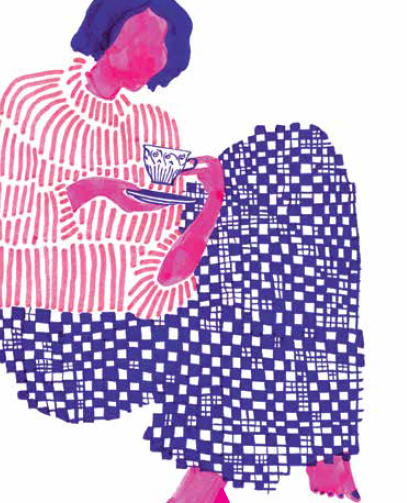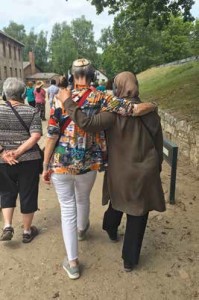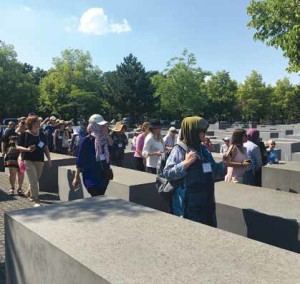Tag : Interfaith solidarity
January 16, 2020 by admin
Across the Barrier

Glorious blue skies stretched over Ruppin Street as I drove to the white brick building of the American Jewish Joint Distribution Committee, adjacent to the Givat Ram campus of the Hebrew University of Jerusalem. My chest prickled, seared skin healing from the radiation to my breast and across my chest to catch any remaining cancer cells left behind after my lumpectomy three months prior. I smelled like burn. Or did it just feel like I did? I had been spared chemotherapy, which felt like God the Woman acceding to my personal entreaty for a pass. She must have noticed that my hands, head and heart were carrying three small sons under five, including a baby I’d speed-weaned days after my diagnosis. The Mediterranean sun poured light onto the streets, the lush lawns, the nearby museums and government complex. Everything sparkled.
Except me. On the path to learning to live again, I was struggling, even stumbling. During the blurred weeks of surgery and radiation, what I’d thought of as my raw vitality and bounce had all but disappeared. I’d always exuded positivity. No more. Happiness felt like a distant country. What was the trick to getting the lilt back in my step? Was there a handbook on how to survive surviving?
That clear luminous Wednesday in March was one of my very first days as a breast cancer “survivor,” and even that label befuddled me. Was “survivor” the right term for a disease that could always recur, however unlikely? Trying to ward off a recurrence, I had signed up for countless support groups at the local center for breast cancer survivors, as if attending more would scare away the malignant cells and translate into more years added on to my life expectancy. I had put my name down for the English-speaking support group, the Hebrew-speaking support group, the couples support group, guided imagery, dance therapy, psychodrama, even belly dancing.
And that afternoon, I was trying something else. The Cope Forum brought together Israeli and Palestinian breast cancer survivors for support and exchange. It was started in 2000 by the JDC’s Middle East program, in partnership with Patient’s Friends Society, a Palestinian NGO, and the Israel Cancer Association. Conveniently, the Cope Forum met in a Jewish part of Jerusalem I knew well. I drove down the streets to the meeting with self-assured familiarity, relieved that I did not need to consider navigating an unknown Palestinian neighborhood in East Jerusalem.
Whiff. I blew cool air into my t-shirt, relieving my charred skin and knotted nerves.
I entered the building from a side entrance, and a security guard motioned me to a closed-door conference room. When I pulled open the heavy door to the nondescript room with its sepia-tinted photos of Jewish leaders, my jaw dropped.
Oh my! There are so many hijabi women in this room! Some 20 women with headscarves, clad in flowing caftans in vibrant blues, browns and maroons, holding paper cups of steaming instant coffee as they chitchatted in Arabic.
Muslim Palestinian women dressed in hijabs and abayas had filled my field of vision over the 20 years I had walked Jerusalem’s streets. But I had never been in a room with so many of them! Not at the Malcha shopping mall. Not at the Beit Sahour Israeli-Palestinian majority male dialogue group I’d attended for a few years.
Mind buzzing, my widened eyes didn’t know where to land. Ten Jewish Israeli breast cancer survivors— identifiable by their clothing (soft cotton shirts and casual pants or jeans, garb similar to what I was wearing)—were talking with Palestinian breast cancer survivors, and the room hummed with women whose body language radiated self-assurance. They carried their curves and scars with confidence and poise, as if their bodies had recorded disease and moved on. While I scrambled to recover a self stolen by cancer, these women had faces alight with vitality. I would later learn that they were all much further along in life-after-breast cancer, with diagnoses and treatment courses that had faded into memory. I wanted in on the secret they’d unlocked to surviving, forging ahead, undefeated.
My shoulders settled. Who were these women, and where were they from? East Jerusalem? Or the West Bank? My mind wandered, considering the differences in language, dress, and faith. These musings were luring me out of the stagnating loop in which I’d gotten stuck after cancer. It was a welcome diversion from my obsession with recurrence-menopause-hot flashes-dying young. At long last, I was distracted from myself.
While a facilitator introduced us to Qigong, a Chinese form of meditation and breathing, I stole glances at some Palestinian women standing next to me. My eyes landed on one in particular. Her heartshaped face was wrapped in a royal blue hijab, and there was kindness in her eyes. Her good spirits were matched by a playful grin.
As the facilitator led us through a warm up, swinging our arms side to side, the smiley woman quipped and cracked jokes under her breath in melodious Arabic, sending Palestinian women to her left and right into peals of laughter. She nodded in my direction, lips turning ever so slightly.
“Hey there,” she said to me in English. “I’m Ibtisam. Nice to meet you!”
“Same,” I smiled back. “I’m Ruth.”
To an outsider, both sides of the Israeli-Palestinian conflict intermingled in that room. But there was actually no conflict at all. We weren’t talking politics. The only apparent adversary was the cancer we were all battling.
After the Qigong activity, all the women socialized. Swapping stories in Arabic, Hebrew and even some English. Laughter that sounded throaty, strong, real. “Tfaddali.” Help yourself. Someone offered me a huge grin and a generous slice of homemade baklawa, leaving my fingers sticky.
In the corner, I balanced the pastry and arched my shoulders, adjusting the stretched white bra atop my prickly pink skin. It was a nursing bra. Apparently I hadn’t let go of my nursing self, even though the milk was long gone. Forever gone. Or perhaps it was myself I wasn’t done nursing?
But these women were past that. And their open smiles suggested that they had enough bandwidth to prop me up, too. In time, I would learn more about the challenges of Palestinian breast cancer journeys. The loneliness and isolation in their respective communities, the stigma of cancer, the concern about becoming a social pariah if they shared their medical history with others, the difficulty of traveling through checkpoints for treatment. And that one particular hijabi woman who stole laughter and merriment from wherever it could be found, Ibtisam Erekat of Abu Dis, would become like a sister to me, one of my dearest friends. Which she has remained to this day, nearly nine years later.
Two women scooted over to the side and unrolled prayer rugs. It was time for Salat al-zhur, the early afternoon prayer. After exchanging a few quiet words, they positioned themselves in the direction of Qiblah, in the direction of the Kaaba in Mecca. “Allahu Akbar.” As they prostrated their bodies, I thought to myself, Pray for me, too.
Suddenly it became clear. A door was opening. To other things, beyond this conference room, beyond the immutability of the Israeli-Palestinian divide, beyond disease. For once, cancer was expanding my world. In the easy togetherness, I felt solace, a blueprint of what could be. In that room, cancer was not only a disease; it was also the tie that binds.
I could have never imagined then that Ibtisam—a devout Palestinian Muslim who lived on the other side of the Separation Barrier—would become my person in Breastcancerland. That bit by bit, intimacy and kinship would be woven between us, transcending the divide. That in the nine years since that first meeting of the support groups she would become the one to nurture my hopes and caress my fears. Ibtisam would model for me how to “survive” breast cancer with humor and grace, and I’d also become her go-to person, the first friend she would call when her stepdaughter got engaged and the one to whom she cried when her mom passed away. I could not have known then that our friendship would weather the tension, complexity and storms of war, that we would serve as each other’s support system when violence reigned and blood was shed. During Operation Protective Edge, the Israel-Gaza war of 2014, when rockets rained down on Israel and airstrikes pounded Gaza, Ibtisam was often the first friend of mine to call to see how I was doing when sirens hit Jerusalem. And I rushed to call her when the news reported crossfire between soldiers and stone throwers in her hometown of Abu Dis.
In that first meeting, I caught a glimpse. Cancer wasn’t only going to close doors. It also had the power to open them. A disease which had felt to me like an end could actually be a sort of beginning.
Ruth Ebenstein is a writer, a historian, public speaker and peace activist. Her forthcoming memoir is Bosom Buddies: How Breast Cancer Fostered an Unexpected Friendship Across the Israeli-Palestinian Divide.
- 1 Comment
November 4, 2019 by admin
Lean on Me: Muslim & Jewish Sisterhood at Auschwitz

Sisterhood of Salaam Shalom Jew and Muslim at Auschwitz.
Photo by Nazli Chaudhry
Not your usual Holocaust learning experience—eight days with 50 American Muslim and Jewish women in Berlin, Warsaw, Krakow and Auschwitz in July. We were with the Sisterhood of Salaam Shalom, a grassroots American organization with the bridge-building goal of bringing Jewish and Muslim women together to get to know each other and stand up together to hatred. (Note: membership has more than tripled since Trump’s election.) Our resource person for the trip was Mehnaz M. Afridi, associate professor at Manhattan College, director of the Holocaust, Genocide, and Interfaith Education Center and author of the book Shoah Through Muslim Eyes.
In Berlin, we were fêted and entertained at a mosque, starting with the sound of a woman’s voice reciting from the Koran, then dinner with Muslims and Christians involved in community projects. We worshipped at the remains of one of the great Berlin synagogues (now headed by a woman rabbi) and saw the building where Regina Jonas once lived; she was the world’s first woman ordained as a rabbi, and she was killed at Auschwitz.
We went through a thousand years of Polish Jewish history at Warsaw’s new POLIN Museum, where we got into a fight with our Polish guide who told us that the Poles had suffered as much as the Jews. Jan, a Jewish Pole, then told me that three million Christian Poles were killed by the Germans. When I shared this with our group, Afridi doubted that number. (“Maybe only 500,000.” Seam- ingly, she falls into the same fallacy she points out in her book, that Muslim countries deny or diminish the Shoah by saying, “Only a million Jews were killed by Hitler.”) I was learning how complicated things are, and how hard it is to change mindset. Statistics remain problematic, but historians have little doubt that indeed between two and three million Polish Christians died during World War II, the large majority from German repression and occupation.

SOSS Building Bridges trip to Berlin and Poland at Berlin’s Memorial to
the Murdered Jews of Europe.
Photo by Nazli Chaudhry
In Warsaw, we visited the city’s one synagogue that survived the war. A beautiful, still-functioning Orthodox synagogue, with an American rabbi from Ohio who knows our trip’s co-leader. In a country with few Muslims, this synagogue is where we met the Tatar Muslim who’d come from Bialystok to speak with us. Muslim Polish history goes back 700 years, but it’s a thin thread. As one academic put it, Poles fear Muslims without ever having met one— a case of “Platonic Islamophobia.”
A decade ago, this lack of diversity among visitors to Auschwitz left future SOSS co-founder Sheryl Olitzky feeling the need to bring people who didn’t look like her—brown, black, non-Jewish, openly LGBTQ —into the post-Auschwitz conversation. And so we were heading for Auschwitz with Olitzky and her SOSS co-founder, Atiya Aftab. And our busload of Muslim and Jewish SOSS members were brown, white, and some first-generation Americans.
But first, Krakow’s old city, undamaged by the war. Its Jews deported, its buildings preserved, Kazimierz, the old Jewish quarter, is now awash in tourism thanks to “Schindler’s List” film locations. Klezmer music, chicken soup and cholent served up by non-Jews. And the unnerving sight of jitneys advertising tours to Auschwitz. I felt I was in Hitler’s planned museum of the extinct race. But now our dining room at Klezmer-Hois Restauracja was filled with Jewish and Muslim women taking selfies. And at the local JCC, we saw proof of a small, reborn Jewish community.
Finally, Auschwitz and Birkenau. Concentration and extermination camps—an endless expanse in the blazing heat. As we left the bus, one of my Muslim sisters said to me, softly, “We’re here to support you.” I was surprised, and touched.
After hours plugged into headphones listening to our knowledgeable, restrained Polish guide, we reached the small building where we stood in a circle for a memorial service with Jewish and Muslim prayers. This was where many of us spoke the names of family and friends’ family members murdered in the Shoah.
Walking back to the bus, in the shade of a small grove of trees, I came upon a cluster of Muslim women from our sisterhood gathered in afternoon prayer, their bright colored head scarves standing out against the green leaves. I was riveted by this image without cliché—Muslim women at prayer in Auschwitz. And I did feel supported.
- No Comments
 Please wait...
Please wait...